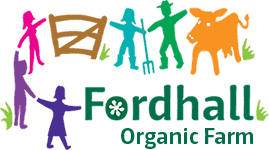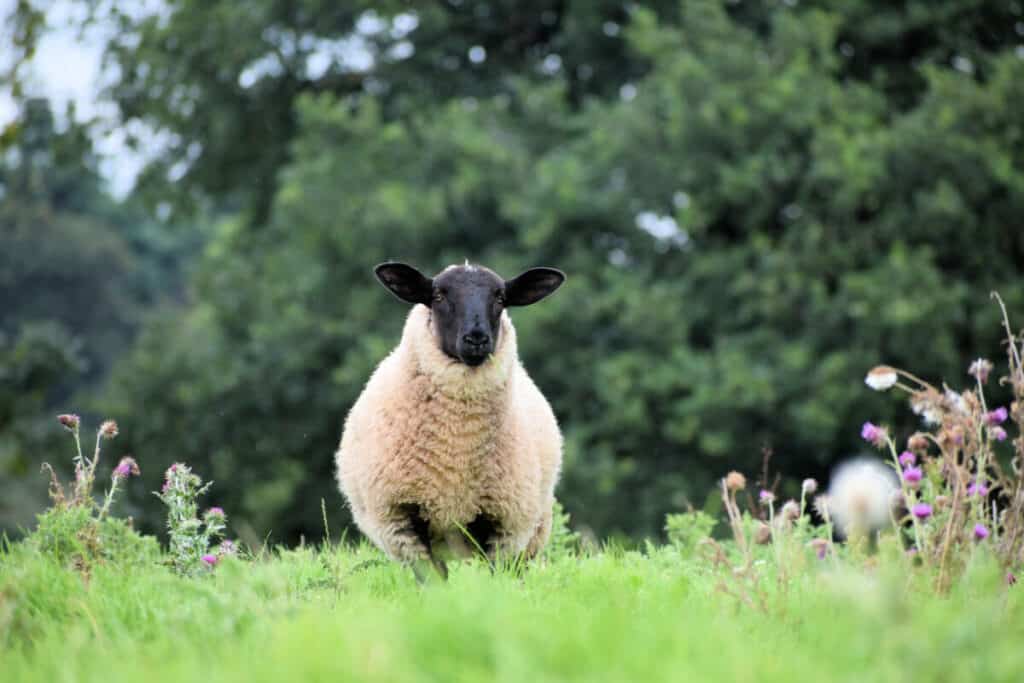What is pasture-fed and why is it important?
The organisation Pasture for Life, puts it simply: “Grazing animals on 100% pasture brings positive impacts for biodiversity and carbon, human health and wellbeing, and animal health and welfare”.
Where is all began at Fordhall
Over the last 50 years of his life, Arthur Hollins developed the system of farming you see today at Fordhall, a system of outdoor grazing called ‘Foggage Farming’. This means that our cattle and sheep live outdoors throughout the year, making them completely grass-fed. Our livestock benefit from over 70 different plant species and the tight root structure in our pastures, meaning they can be outdoors all year round without damaging the ground. With wetter low ground and sandy hills, the farm landscape means the livestock can be rotated through the year, reflecting the seasons and associated weather.
Fordhall has been involved with and members of Pasture-Fed Livestock Association (Pasture for Life) since its inception in 2009. Run as a Community Interest Company (CIC) since 2011, the membership includes farmers, butchers, retailers and consumers – all with a passion to increase the supply and market for pastured meat. The Association developed a set of strict Certification Standards with its partners to provide clear definition on what the term means, ensuring only farms that adhere to the rules can claim their meat is ‘Pasture for Life’.
The case ‘for’ is growing and with it more momentum
There have long been discussions circulating about the negative impacts of livestock farming on the environment, coming sharply into light as the climate crisis deepens. However, recent research published is helping to evidence the case for a better way of farming that brings benefits for the land, animals and planet.
The UK Centre for Ecology & Hydrology recently published the results of their study, ‘Sustainable and viable?’, assessing a pasture-fed livestock system working with more than 50 farms across Britain.
Dr Lisa Norton, an agro-ecologist at the UK Centre for Ecology & Hydrology, and colleagues, worked with farmers to assess such approaches using a range of scientific methods including the collection of environmental, economic and social data.
“Despite considerable variability between farms, we found that the Pasture for Life Association (PFLA) approach to livestock production contributes to wider delivery of environment benefits and public goods, including increasing plant species and structural vegetation diversity, maintaining soil carbon and the inclusion of agri-environment options. We found that farmers that had been PFLA practitioners for longer tended to be better at this public good delivery.
“Importantly, we also showed that the delivery of public goods did not come at the cost of farm viability; PFLA farms often out-performed their conventional equivalents from an economic perspective.
“The research also provided crucial insights into the importance of the social aspects of these innovative low-input, biodiversity-positive farming practices. We found that individual farmers were motivated to share their experiences with and learn from other farmers and adapt their practices accordingly. This social aspect was also very important for their wellbeing.
“Aligned work on two of the farms in the study additionally showed that positive benefits may also extend to aspects of meat quality from these systems.
“We highlight the importance of knowing where our food comes from in terms of how ‘good’ or ‘bad’ it may be for the planet. More work is required to understand the detailed carbon budgets associated with pasture-fed systems like these where farmers don’t use livestock feed and are focused on both environmental wellbeing and production.
“Our research does suggest, however, that long-term engagement with like-minded groups and practitioners promoting such methods fosters peer-to-peer learning and innovation, encouraging farmers with steps to make a viable living as well as provide environmental benefits. This could be fundamental to learning how to bring about the necessary shifts in livestock systems that will help create resilient and sustainable outcomes for agriculture.”
Fordhall is proud to remain at the forefront of pasture-fed practices, continuing to share our experiences, learn from others and evolve as a farm.
Nicola Syred, Community and Partnerships Lead
Summary of the report reproduced with the kind permission of the author Dr Lisa Norton.
If you’d like to review the full report and learn more about Pasture for Life, please do visit the links below:
pastureforlife.org
Frontiers is the 3rd most-cited and 6th largest research publisher and open science platform.
Learning from innovative practitioners: Evidence for the sustainability and resilience of pasture fed livestock systems
https://www.frontiersin.org/articles/10.3389/fsufs.2022.1012691/full
This article was first featured in the Autumn 2023 edition of the Grazer magazine. For more info and to subscribe, visit:
FCLI Shares,The Grazer,Calendars,Tickets & Books – Fordhall Farm


